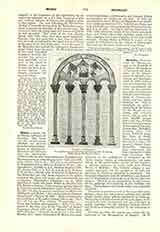

Medea , a titular see of Thrace, suffragan of Heraclea. This name and the modern name (Midieh) are derived from the ancient Salmydessos or Almydessos. Herodotus (IV; 93) says that the inhabitants yielded to Darius after some resistance; Xenophon and his companions in arms subjugated it with much difficulty (Anab., VII, 5, 12). The city is also mentioned by Sophocles (Antig., 969), by Aeschylus (Prom., 726), who places it wrongly in Asia, Diodorus Siculus (XIV, 37), Strabo (VII, vi, 1; XII, iii, 3; I, iii, 4, 7), Ptolemy (VII, xi, etc.), who all agree in locating its harbor on the Black Sea and very much exposed to the winds; moreover the shore was sandy and unfavorable for navigation. Theophanes (Chronogr., an. m. 6255) mentions it under the name Medeia in the year 763. The Emperor Joannes Cantacuzenus, having taken it in 1352, was almost killed there by the Turks (Histor., IV, 10); it is also frequently mentioned in official acts (Miklosich and Muller, “Acta patriarchatus Constantinopolitani”, Vienna, II, 600). Medea is mentioned as a suffragan of Heraclea towards 900 in the “Notitia” of Leo the Wise (Gelzer, “Ungedruckte… Texte der Notitiae episcopatuum”, 552); it is mentioned in the same way in the “Notitia” of Manuel Comnenus about 1170 and of Michael VIII about 1270 (Parthey, “Hieroclis Synecdemus”, 104, 204). Shortly after, under Andronicus II, Medea was made an autocephalous archbishopric, and towards 1330 a metropolitan see (Gelzer, op. cit., 601). In 1623 the metropolitan sees of Medea and Sozopolis were united, to be again separated in 1715. A little later Medea was united with Bizya, at least among the Orthodox Greeks, and it is so still. Le Quien (Oriens christianus, I, 1143-1146) gives the names of five Greek metropolitans, and Eubel (Hierarchia catholica medii Zvi, I, 355) mentions two Latin titularies of the fourteenth century. Today Medea or Midieh is a part of the sanjak of Kirk-Kelissi in the vilayet of Adrianople; there are two thousand Greeks and some Turks.
S. VAILHE

